Flight, as a magazine theme, can suggest numerous interpretations including a state of transition, a secret passage, or confronting the unknown, according to TLR: The Literary Review Editor Kate Munning. She, along with her crew, chose several pieces to reflect this broad theme. Continue reading “The Literary Review – Fall 2015”
NewPages Blog
At the NewPages Blog readers and writers can catch up with their favorite literary and alternative magazines, independent and university presses, creative writing programs, and writing and literary events. Find new books, new issue announcements, contest winners, and so much more!
Cumberland River Review – Issue 5
Cumberland River Review’s self-defined goal is “to feature work of moral consequence—work that transports us.” And not just sometimes, but “always.” I tried to sort that out from the added fact that the publication is produced by the department of English at Trevecca Nazarene University, which could further weight whole concept of “moral consequence”— as if we English folk don’t do it enough on our own, let’s just add the mission of a Christian university to that. Relax—we’re not talking preachy, biblical moralities here. Rather, CRR editors have a clear sense of selecting writing that seeks to question, even challenge, what moral means, and in doing so, cause readers to seriously consider the consequences in their own lives. Continue reading “Cumberland River Review – Issue 5”
Spread the word!
Words Without Borders – February 2016
For ten years, Words Without Borders has been publishing an annual graphic novel issue each February. According to Editorial Director Susan Harris in “Graphic Novels at WWB: The First Ten Years,” this issue brings the amount of graphic works on the site to a whopping 174. A link to the entire graphic archive is provided, and after reading this issue, readers won’t be able to resist diving in. Continue reading “Words Without Borders – February 2016”
Spread the word!
Superstition Review – Fall 2015
Produced by the students of creative writing and web design at Arizona State University, the online Superstition Review showcases a great selection of writing and art, all easily accessible from a cell phone. Continue reading “Superstition Review – Fall 2015”
Spread the word!
Brilliant Flash Fiction – January 2016
Brilliant Flash Fiction, the online literary magazine, is all about the flash. Individual issues are made up of one continuously scrolling page, eliminating the distraction of returning to a table of contents or turning digital pages, and there’s no PDF download required. The stories fall down the page in quick succession, accented by the flashes of color the accompanying photographs provide. Readers are carried from one story to the next with just enough time to get acclimated to whichever setting or character’s mind we’re suddenly thrust into. Continue reading “Brilliant Flash Fiction – January 2016”
Spread the word!
Lillian Li on Writing Characters of Color
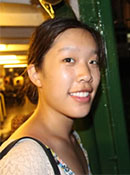 In her Glimmer Train Bulletin essay “Why Write Characters of Color?” UofM MFA candidate Lillian Li writes, “The question . . . is not rhetorical; it is not one a moderator asks to kick off a stale panel discussion. It is a real and urgent question, one of craft, of race, of character.”
In her Glimmer Train Bulletin essay “Why Write Characters of Color?” UofM MFA candidate Lillian Li writes, “The question . . . is not rhetorical; it is not one a moderator asks to kick off a stale panel discussion. It is a real and urgent question, one of craft, of race, of character.”
Li discusses both the arbitrary and reasoned decisions writers make, from character names to plot points. She explains using a fire as a “placeholder” event for a story she’s writing. An arbitrary choice that, as her writing progressed, became more central to the story. But, to ignore the question of Why a fire? – “the event would have stood out, like a lump of flour unincorporated into the narrative gravy.” Li writes, “When American writers arbitrarily decide the race of their characters, and then ignore the question of race, they are courting the same conundrum, even if they phrase it a different way.”
Read the rest online in Glimmer Train Bulletin #110, which also includes essays by David Minzer and Christine Grace.
Spread the word!
Lit Mag Covers :: Picks of the Week
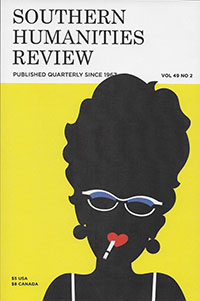 “Lubbock Woman” by Dirk Fowler takes the cover of Southern Humanities Review 49.2. Visually based on a waitress from Furr’s Cafeteria in Lubbuck, Texas, Fowler writes, “This image began its life in 2003 as a pretty crudely executed letterpress concert poster for the band Sugarpuss. I only made a few of them, but I liked the illustration and knew I wanted to explore it again at some point.”
“Lubbock Woman” by Dirk Fowler takes the cover of Southern Humanities Review 49.2. Visually based on a waitress from Furr’s Cafeteria in Lubbuck, Texas, Fowler writes, “This image began its life in 2003 as a pretty crudely executed letterpress concert poster for the band Sugarpuss. I only made a few of them, but I liked the illustration and knew I wanted to explore it again at some point.”
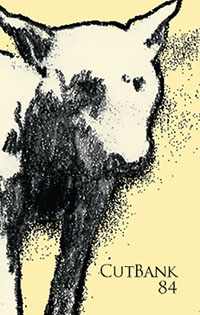 It’s a dog. Enough said. Margaret Darling is the artist for CutBank 84.
It’s a dog. Enough said. Margaret Darling is the artist for CutBank 84.
 Definitely an eye-catching slight of hand, Cimarron Review Winter 2016 features photography by Bradley Phillips, “Feather,” from the series Abolition of Man.
Definitely an eye-catching slight of hand, Cimarron Review Winter 2016 features photography by Bradley Phillips, “Feather,” from the series Abolition of Man.
Spread the word!
Books :: Black River Chapbook Competition
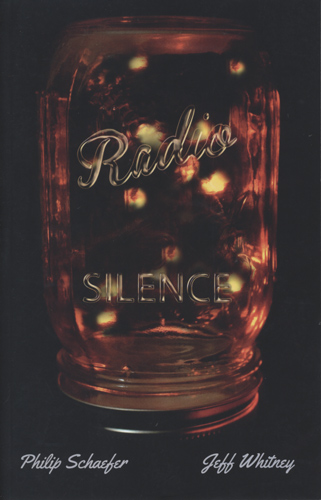 Philip Schaefer and Jeff Whitney’s collaborative Radio Silence was published by Black Lawrence Press last month. Winner of the 2014 Black River Chapbook Competition, Radio Silence utilizes “vivid and sometimes startling image and music” and “turns absence into sound.”
Philip Schaefer and Jeff Whitney’s collaborative Radio Silence was published by Black Lawrence Press last month. Winner of the 2014 Black River Chapbook Competition, Radio Silence utilizes “vivid and sometimes startling image and music” and “turns absence into sound.”
The second published collaboration between Schaefer and Whitney, Radio Silence is now available from the Black Lawrence Press website.
[quote from SPD]
Spread the word!
American Life in Poetry :: Dorianne Laux
American Life in Poetry: Column 569
BY TED KOOSER, U.S. POET LAUREATE
After my mother died, her best friend told me that they were so close that they could sit together in a room for an hour and neither felt she had to say a word. Here’s a fine poem by Dorianne Laux, about that kind of silence. Her most recent book is The Book of Men (W.W. Norton & Co., 2012) and she lives in North Carolina.
Enough Music
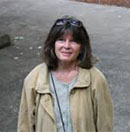 Sometimes, when we’re on a long drive,
Sometimes, when we’re on a long drive,
and we’ve talked enough and listened
to enough music and stopped twice,
once to eat, once to see the view,
we fall into this rhythm of silence.
It swings back and forth between us
like a rope over a lake.
Maybe it’s what we don’t say
that saves us.
We do not accept unsolicited submissions. American Life in Poetry is made possible by The Poetry Foundation (www.poetryfoundation.org), publisher of Poetry magazine. It is also supported by the Department of English at the University of Nebraska-Lincoln. Poem copyright ©1994 by Dorianne Laux, “Enough Music,” (What We Carry, BOA Editions, 1994). Poem reprinted by permission of Dorianne Laux and the publisher. Introduction copyright © 2015 by The Poetry Foundation. The introduction’s author, Ted Kooser, served as United States Poet Laureate Consultant in Poetry to the Library of Congress from 2004-2006.
Spread the word!
New Lit on the Block :: Cherry Tree
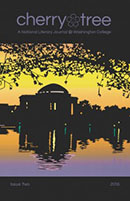 Cherry Tree: A National Literary Journal is a new print annual of poetry, fiction, and creative nonfiction from Literary House Press at Washington College. While Washington College is a small liberal arts college that takes great pride in its undergraduate creative writing program, Founder and Editor Jehanne Dubrow realized the one thing it lacked (in comparison to peer institutions) was a national literary journal, a publication that provided the opportunity for undergrad students to participate actively in the wider literary world and the current conversations happening there. “Cherry Tree was a long time coming for us and we’re so glad to be here at last!”
Cherry Tree: A National Literary Journal is a new print annual of poetry, fiction, and creative nonfiction from Literary House Press at Washington College. While Washington College is a small liberal arts college that takes great pride in its undergraduate creative writing program, Founder and Editor Jehanne Dubrow realized the one thing it lacked (in comparison to peer institutions) was a national literary journal, a publication that provided the opportunity for undergrad students to participate actively in the wider literary world and the current conversations happening there. “Cherry Tree was a long time coming for us and we’re so glad to be here at last!”
As may seem obvious, the name Cherry Tree honors George Washington, but perhaps less well known, the editors share, is the fact that, “in 1782, Washington gifted ‘the College at Chester’ 50 guineas, consented to serve on its Board, and gave the educational institution permission to use his name. In the American imagination, George Washington is a figure who has come to represent both truth-telling and mythmaking. The famous story of the cherry tree—I can’t tell a lie, Pa; you know I can’t tell a lie. I did cut it with my hatchet.—reminds us that there is truth even in invention, that even apocrypha can convey the facts of life.”
Truth be told, Cherry Tree is extremely well-staffed for a start-up publication. Jehanne Dubrow is the author of five poetry collections, including most recently The Arranged Marriage (UNMP 2015). Her scholarly and teaching interests include creative writing, formal poetry, prosody, American Jewish literature, Holocaust studies, and the graphic novel. Managing Editor Lindsay Lusby, winner of the 2015 Fairy Tale Review Award in Poetry, is Assistant Director of the Rose O’Neill Literary House and Assistant Editor of the Literary House Press. Poetry & Creative Nonfiction Editor James is Associate Professor of English at Washington College, and Fiction Editor Kate Kostelnik earned her Ph.D in English from the University of Nebraska and her MFA from the University of Montana and now teaches at the University of Virginia in Charlottesville.
Cherry Tree also involves a staff of student screeners serving the first round of reading for all submissions during the open reading period. Selected works are moved up to Senior Readers, and then Fiction Editor, and Poetry & Creative Nonfiction Editor. Dubrow makes the final determination about which pieces will be published. Student screeners are all undergraduate students at Washington College (or very recent graduates) who have successfully completed the English Department’s Literary Editing & Publishing class.
Writers interested in submitting to the publication will appreciate the publication’s mission. According to the editors, “We are writers who value and publish well-crafted short stories, poems, and creative nonfiction essays that are not afraid to make us care. We want work that braves to be, that dares to be. We encourage well-informed work where the form understands its relationship with the content. We want pieces that seem wise, that are unafraid to confront topics that matter, and that speak with urgency, that beg for an ear to listen. We want to read vividly-drawn characters who challenge and enlarge our sympathy.”
Readers coming to Cherry Tree will find what the editors believe to be the best poems, short stories, and essays holding “the truth and lyricism of language above sentimentality and message-making” from both established and emerging writers. While readers may choose to “cherry-pick” pieces, the editors advocate reading a full issue from cover to cover, “because we always order the pieces in such a way as to create a sort of thematic story arc, making the reading experience more engrossing and meaningful.”
Previously published contributors include Rick Barot, Jericho Brown, Jennifer S. Cheng, Claudia Emerson, Vievee Francis, Anna Journey, Julie Kane, Roy Kesey, Matthew Lippman, Paul Lisicky, Matthew Olzmann, Emilia Phillips, sam sax, Bruce Snider, and Julie Marie Wade.
Cherry Tree opens for general submissions in the categories of poetry, fiction, and creative nonfiction from August 15 to October 15 each year via Submittable only.
Spread the word!
Michigan Quarterly Review 2015 Literary Prizes
 $1000 Lawrence Foundation Prize 2015
$1000 Lawrence Foundation Prize 2015
Alyson Hagy [photo: Ted Brummond] has won the thirty-eighth Lawrence Foundation Prize, joining, among other authors, Charles Baxter, Paul Bowles, Susan Dodd, Clark Blaise, Sena Jeter Naslund, Rebecca Makkai, Alice Mattison, and Lynne Sharon Schwartz. The prize is awarded annually by the Editorial Board of MQR to the author of the best short story published that year in the journal. A mature, finely crafted story set in Yellowstone country, Hagy’s “Switchback” appeared in the Spring 2015 issue.
 $500 Laurence Goldstein Poetry Prize
$500 Laurence Goldstein Poetry Prize
Raymond McDaniel has won the 2015 Laurence Goldstein Poetry Prize, which is awarded annually to the author of the best poem or group of poems appearing that year in the MQR. His poem “Claire Lenoir,” appeared in the Fall 2015 issue. This year’s judge, Paisley Rekdal, writes: “The poem marvelously captures, in tone and form, the very essence of the uncanny: one of the poem’s central subjects. The poem renders the process through which we gain knowledge of ourselves and others both mysterious and terrifying at once, recalling for me Howard Baker’s plaintive question during the Watergate trials: What did you know, and when did you know it?”
 $500 Page Davidson Clayton Prize for Emerging Poets
$500 Page Davidson Clayton Prize for Emerging Poets
Katie Hartsock has won the 2015 Page Davidson Clayton Prize for Emerging Poets, which is awarded annually by the editors to the best poet appearing in MQR who has not yet published a book. Poetry Editor Keith Taylor writes about her poem “The Sister Karamazov,” which appeared in our Spring 2015 issue, “We were very impressed by this poet’s ability to enter one of the classics and to reimagine it, adding another emotional and metaphoric level to something that a lesser imagination might see as fixed and impenetrable.”
Spread the word!
The New Guard Literary BANG! Online
 BANG! is a monthly author online showcase published by The New Guard. Three pieces in any combination of previously unpublished poetry shorts or fiction or nonfiction are featured online for a month. Submission period runs all year round with the next installment planned for April 4, 2016. The March 2016 BANG! author is Lyall Harris. Past authors have included Alexandra Oliver, Mike Heppner, Marc Mewshaw, Timothy Dyke, Marcia Popp, Quenton Baker, Joshua Graber, Charles Wyatt, Julio Duggan, Jonathan Segol, Lissa Kiernan, Roger Bonair-Agard, James Kimbrell, Bridget Boland, E.G. Cunningham, Melissa Goode, Mark Wagstaff, Carla Stern, Sarah Glass, Jennifer Amell, Zakia R. Khwaja, Julie Poitras Santos and Amy Nash.
BANG! is a monthly author online showcase published by The New Guard. Three pieces in any combination of previously unpublished poetry shorts or fiction or nonfiction are featured online for a month. Submission period runs all year round with the next installment planned for April 4, 2016. The March 2016 BANG! author is Lyall Harris. Past authors have included Alexandra Oliver, Mike Heppner, Marc Mewshaw, Timothy Dyke, Marcia Popp, Quenton Baker, Joshua Graber, Charles Wyatt, Julio Duggan, Jonathan Segol, Lissa Kiernan, Roger Bonair-Agard, James Kimbrell, Bridget Boland, E.G. Cunningham, Melissa Goode, Mark Wagstaff, Carla Stern, Sarah Glass, Jennifer Amell, Zakia R. Khwaja, Julie Poitras Santos and Amy Nash.
Spread the word!
Books :: 2016 Felix Pollak Prize in Poetry
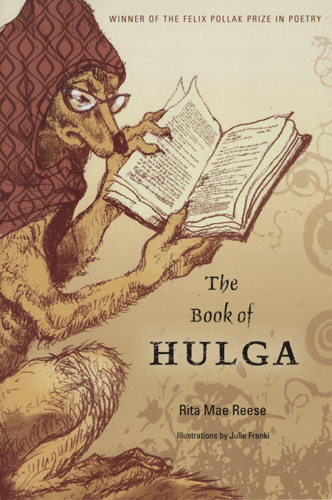 Rita Mae Reese’s The Book of Hulga, winner of the University of Wisconsin Press Felix Pollak Prize in Poetry, is to be published later this month. Selected by Denise Duhamel, Reese’s second poetry collection includes 9 black and white illustrations by Julie Franki and “speculates—with humor, tenderness, and a brutal precision—on a character that Flannery O’Connor envisioned but did not live long enough to write.”
Rita Mae Reese’s The Book of Hulga, winner of the University of Wisconsin Press Felix Pollak Prize in Poetry, is to be published later this month. Selected by Denise Duhamel, Reese’s second poetry collection includes 9 black and white illustrations by Julie Franki and “speculates—with humor, tenderness, and a brutal precision—on a character that Flannery O’Connor envisioned but did not live long enough to write.”
To hear Reese reading a selection from The Book of Hulga, or to order a copy, visit the University of Wisconsin Press website.
[quote from book cover]
Spread the word!
Editor-in-Chief Wanted Vine Leaves Literary Journal
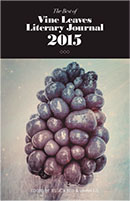 Vine Leaves Literary Journal, featuring “the lost writing form of the vignette,” is accepting applications for Editor-in-Chief to manage the biannual print and digital publication as well as develop a clear vision for its literary and financial stability. Qualifications include a creative self-starter with a minimum two years managerial and editorial experience; a voracious and diverse reader with extensive literary and design networks, excellent communications skills, and a relentless passion for supporting aspiring writers; ideally, an author yourself. This is a part-time, renewable, three-year contract, beginning late June 2016 reporting to Publisher Jessica Bell. This is a volunteer position until the Journal becomes profitable, when a reasonable salary will be negotiated. Applications close Friday, April 29, 2016 with Skype interviews late May/early June. Full posting here.
Vine Leaves Literary Journal, featuring “the lost writing form of the vignette,” is accepting applications for Editor-in-Chief to manage the biannual print and digital publication as well as develop a clear vision for its literary and financial stability. Qualifications include a creative self-starter with a minimum two years managerial and editorial experience; a voracious and diverse reader with extensive literary and design networks, excellent communications skills, and a relentless passion for supporting aspiring writers; ideally, an author yourself. This is a part-time, renewable, three-year contract, beginning late June 2016 reporting to Publisher Jessica Bell. This is a volunteer position until the Journal becomes profitable, when a reasonable salary will be negotiated. Applications close Friday, April 29, 2016 with Skype interviews late May/early June. Full posting here.
Spread the word!
Arcadia on The New Chican@
 Arcadia 10.1 is themed “The New Chican@” with guest editor Ito Romo. The issue features short fiction by Luke Neftalí Villafranca, poetry by Octavio Quintanilla, fiction and nonfiction by Sarah Cortez, and a poem by Tim Z. Hernandezm, with original art from Vincent Valdez. Romo writes in his introduction, “I wanted to put together a group of artists who, with their art, be it visual or literary, tell a story honestly and beautifully – those were my only criteria. And so, I’ve chosen a group of Mexican American artists who have recreated for us, with images and words, the current strange and dark malaise of the invisible, of the forgotten.”
Arcadia 10.1 is themed “The New Chican@” with guest editor Ito Romo. The issue features short fiction by Luke Neftalí Villafranca, poetry by Octavio Quintanilla, fiction and nonfiction by Sarah Cortez, and a poem by Tim Z. Hernandezm, with original art from Vincent Valdez. Romo writes in his introduction, “I wanted to put together a group of artists who, with their art, be it visual or literary, tell a story honestly and beautifully – those were my only criteria. And so, I’ve chosen a group of Mexican American artists who have recreated for us, with images and words, the current strange and dark malaise of the invisible, of the forgotten.”
Spread the word!
Rattle Feminist Poets Issue
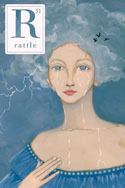 For Rattle #51, the editors put out the call for submissions from women poets with the same great uncertaintly every magazine risks when planning a themed issue or special feature. Rattle editors must have been pleased, as the issue features “a lengthy tribute to 31 feminist poets” selected from “the thousands of poems” submitted. Also included in the issue is a conversation with Maggie Nelson, author of The Argonauts. The feature explores the question, “What does it mean to be a feminist poet in the 21st century?” Rattle editors surmise: “There might be as many answers to that question as there are feminist poets—each of those featured provide their perspectives in an especially important contributor notes section.”
For Rattle #51, the editors put out the call for submissions from women poets with the same great uncertaintly every magazine risks when planning a themed issue or special feature. Rattle editors must have been pleased, as the issue features “a lengthy tribute to 31 feminist poets” selected from “the thousands of poems” submitted. Also included in the issue is a conversation with Maggie Nelson, author of The Argonauts. The feature explores the question, “What does it mean to be a feminist poet in the 21st century?” Rattle editors surmise: “There might be as many answers to that question as there are feminist poets—each of those featured provide their perspectives in an especially important contributor notes section.”
Featured poets: Lisa Baird, Michele Battiste, Roberta Beary, Heather Bell, Claire Blotter, Leila Chatti, Ann Clark, Barbara Crooker, Denise Duhamel & Maureen Seaton, Julie R. Enszer, Alexis Pauline Gumbs, Beth Gylys, Kelsey Hagarman, Sandra Kohler, Amy Miller, Abby E. Murray, Jenny Qi, Jessy Randall, Laura Read, Lucinda Roy, Yaccaira Salvatierra, Amber Shockley, Robin Silbergleid, Julie Steiner, Lisa Summe, Katherine Barrett Swett, Kelly Grace Thomas, Amy Uyematsu, Julie Marie Wade, and Sara Watson.
Spread the word!
Albeit Online Scholarly and Teaching Journal
 Albeit is a free, online, MLA-indexed journal of scholarship and pedagogy that “strives to fill the academic space between scholarly journal articles and teaching documents.”
Albeit is a free, online, MLA-indexed journal of scholarship and pedagogy that “strives to fill the academic space between scholarly journal articles and teaching documents.”
Co-founded by Tracy Bealer, PhD in American literature with an emphasis on 20th century masculinity, and Natalie Leppard, PhD in American literature with an emphasis on 20th century terrorism, Albeit publishes scholarly articles and “practical documents” such as syllabi, lesson plans, and book reviews that can be used alongside an existing course, as a theme, or upon which to build a course. The articles and documents are meant to be accessible to professors and college students alike.
Published twice a year, previous issue themes include Horror (1.1), Failure (1.2), and Women on War (2.1). The current call for proposals is for issue 4.1: Black Lives Matter. Abstracts are due by August 1 with complete articles by October.
Spread the word!
The Revolution Will Have Its Sky
As I sat down with The Revolution Will Have Its Sky by Maria Garcia Teutsch, I was, in the longer term, in the midst of reading Tolstoy’s War and Peace. I could never have guessed Maria Garcia Teutsch’s Revolution would be a perfect pairing with that venerable epic, and yet, much to my delight, it is. The Revolution Will Have Its Sky is, of course, much shorter in length, but it explores and illuminates many of the same themes and dichotomies of Tolstoy’s epic novel, and to similar thought-provoking effect. While that may seem hefty praise, I challenge any reader of Teutsch’s work to disagree that its ideas, comparisons, and discoveries succinctly coincide with those long found in War and Peace. The Revolution Will Have Its Sky is in its own right an enticing, nuanced, and many-layered collection of poems that will keep you satisfied while you read, and deep in thought long after you have put it down. Continue reading “The Revolution Will Have Its Sky”
Spread the word!
Almost Home
“Stories, like real life, can strip you of the prettier features of illusion.” This is exactly the kind of line that ensures us we are in capable hands with Githa Hariharan, who narrates her travelogue Almost Home: Finding a Place in the World from Kashmir to New York more as a travel guide, less as the star of her own world. To read this book is to venture on a rigorous journey around the globe and through pockets of time. As a fellow travel writer and having also lived a peripatetic life that crosses continents and hemispheres, this is the best travel book I have ever read. Continue reading “Almost Home”
Spread the word!
The Great Spring
Part travelogue, part Buddhist meditation, Natalie Goldberg’s latest book, The Great Spring: Writing, Zen, and This Zigzag Life, was published this past February along with the 30th anniversary edition of her classic title Writing Down the Bones. Through graceful prose and occasional humor, these essayistic memoirs weave between the covers as she tackles a reel of subjects such as death, the promises and faults of Buddhism, stalking, and, of course, writing. Continue reading “The Great Spring”
Spread the word!
Chord
There is saying that “Those who can, do; those who can’t, teach,” derisively suggesting that teachers only resort to teaching because they are professional failures in their chosen fields. But Rick Barot’s Chord is the kind of book that will make readers see the reality that sometimes those who can—like Barot—are also willing to teach. Luckily for us. Continue reading “Chord”
Spread the word!
System of Ghosts
In addition to traditional rain showers, April 2016 will bring the launch of Lindsay Tigue’s book of poetry, System of Ghosts, winner of the 2015 Iowa Poetry Prize. In this, her first book, Tigue has mastered a technique of taking facts—some obscure—and using them as a springboard to wherever her imagination leads her. Judge Craig Moran Teicher says these bits of information are “gathered magpielike,” leading to insight. Continue reading “System of Ghosts”
Spread the word!
Bystanders
Bystanders, by Tara Laskowski, due out May 2016, contains thirteen short stories with titles that make you want to see who the bystanders are and what they’re up to. The majority center on young couples, and several pieces would be right at home in the old TV series “The Twilight Zone,” like “The Monitor” in which neighbors see each other’s babies on their own baby monitors. Plus, there’s another strange figure who keeps appearing. Continue reading “Bystanders”
Spread the word!
Where the Wind Can Find It
A collection of short stories that drips with artistry and revelatory truths, Where the Wind Can Find It is a masterful exploration of the struggle between who and where we were and are, and who we want to be. Continue reading “Where the Wind Can Find It”
Spread the word!
Dead White Guys
If you half-snoozed through the classics at school, reading Matt Burriesci’s Dead White Guys is a shrewd way to refresh your knowledge. The book is subtitled A Father, His Daughter and the Great Books of the Western World. It includes visits to philosophers and storytellers such as Plato and Plutarch, Montaigne and Shakespeare, John Locke, Adam Smith and other notables. Author Matt Burriesci deftly combines their teachings with his own experiences and ideas to equip his daughter with lessons for a good life. Continue reading “Dead White Guys”
Spread the word!
Companion Animal
Magdalena Zurawski began writing her poetry collection Companion Animal in a state of doubt about her own abilities as a poet (to cite her final selection from the book, “Dear Reader,”). In 2009, when she was feeling particularly unsure about her abilities to write, a close friend encouraged her to read and write poetry daily and cultivate a loosely-supervised writing routine. The poems that stemmed from this exercise explore the realities of daily life—financial stress, relationships, lost loved ones, and of course, the companionship of a tiny dog—while questioning the relevancy of poetry and the act of writing itself. Continue reading “Companion Animal”
Spread the word!
Of Things
Michael Donhauser is an accomplished Austrian poet, essayist, and critic whose books date back nearly thirty years, but he is not widely known to English readers. It makes him a great candidate for Dichten—Burning Deck’s translation series, which brings this rich and varied collection, Of Things (first published in German nearly twenty years ago), to a needed new audience. It’s a dizzyingly varied work, finely translated by Nick Hoff and Andrew Joron. It is philosophically poised but historically informed, personal, scientific, whimsical, and serious—showcasing a real rucksack of literary tools that Donhauser brings into the field with him to sketch, like the plein air painter, his subjects. Continue reading “Of Things”
Spread the word!
I’m No Longer Troubled by the Extravagance
I used to laugh at the notion of singularity because it objectified the pluralizing concept of always wanting more. Good poetry is like that; it is circulatory, a wheel constantly spinning between the yin and the yang of existence. I don’t mind that one poem is different than the next, only that somehow the wheel doesn’t get stuck and I become lost in the duality of it all. Continue reading “I’m No Longer Troubled by the Extravagance”
Spread the word!
Sex and Death
The blank page, always a canvas with vocabulary a pallet and creativity the brush, is a daunting image; it is there though, hanging in the balance like a friendship on a tightrope. It is what can be done with such a task that matters the most. And Ben Tanzer emphatically delivers with an unapologetic stroke in his latest collection Sex and Death. Continue reading “Sex and Death”
Spread the word!
Phantom Pains of Madness
Phantom pain is one of those peculiar syndromes that has received widespread recognition for its oddness, mostly. Noelle Kocot’s Phantom Pains of Madness trickles and drips with oddity as well, the entire piece written one word at a time. Each word receives its own line, which makes the book very easy to read: a delight in the modern age. It also gives the book a dimension and heft that is incomparable. But Noelle’s humor disarms the reader often and keeps the book light, while its content is quite heavy. This is her seventh book of poetry, and there is no doubt that she has achieved a wringing out of all that isn’t her. Phantom Pains of Madness is a truly original work and a very rewarding read. Continue reading “Phantom Pains of Madness”
Spread the word!
The Last Mistress of Jose Rizal
Sometimes our roots are someplace else and we craft our whole lives in places away from our original source like outsiders wishing earnestly to ‘belong.’ We absorb a lot of what is new and retain or let go of our past. Generations pass, the memory of the roots begin to get weaker, yet it filters through families, countries, history. History absorbs the effects of immigration and narrates his stories, her stories, their stories. We meet people, engage in relationships, progress through situations, and separate moments from our different lives converge at common points of emotional realizations. Continue reading “The Last Mistress of Jose Rizal”
Spread the word!
Lit Mag Covers :: Picks of the Week
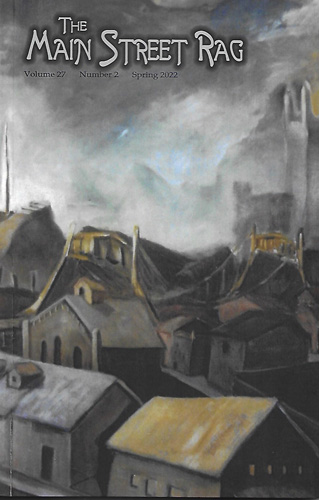 This week’s theme seems to be the color – something of a burnt umber – that draws my eye. Main Street Rag 21.1 features the photography and an accompanying interview with Tammy Ruggles. “Afternoon Leisure” is the cover photo.
This week’s theme seems to be the color – something of a burnt umber – that draws my eye. Main Street Rag 21.1 features the photography and an accompanying interview with Tammy Ruggles. “Afternoon Leisure” is the cover photo.
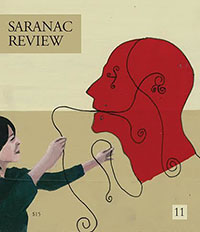 Saranac Review 11 features cover and full color internal art by Canadian artists, Michael Dumontier and Neil Farber, formerly known as The Royal Art Lodge.
Saranac Review 11 features cover and full color internal art by Canadian artists, Michael Dumontier and Neil Farber, formerly known as The Royal Art Lodge.
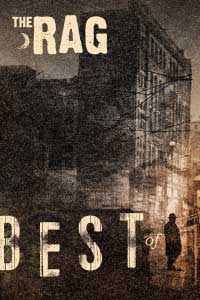 The Rag online monthly “focuses on grittier forms of contemporary short fiction,” with this issue featuring Alan Shapiro’s “Has and Have” with cover art by Matthew Laznicka.
The Rag online monthly “focuses on grittier forms of contemporary short fiction,” with this issue featuring Alan Shapiro’s “Has and Have” with cover art by Matthew Laznicka.
Spread the word!
Digital Forum: What is Well-Educated?
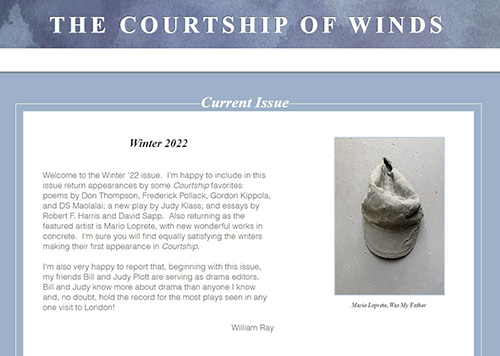 The inaugural issue of the revived Courtship of the Winds features a Digital Forum in which the editor asks five questions related to education reform, including “What does it mean to be well-educated?” and “Which educational systems in the U.S. or in other countries would you point to as a model for reform efforts here? What has made them successful?”
The inaugural issue of the revived Courtship of the Winds features a Digital Forum in which the editor asks five questions related to education reform, including “What does it mean to be well-educated?” and “Which educational systems in the U.S. or in other countries would you point to as a model for reform efforts here? What has made them successful?”
Editor William V. Ray engaged a variety of professionals in the conversation, and while based in Massachusetts, the topic is pertinent nation wide. Participants include: Rachael Avery Barton, Middle School History Teacher; Michael Capuano, U.S. Representative for Massachusetts’ 7th District; Kenneth Hawes, Senior Lecturer in Education, Wellesley College; Phillip James, History Department Coordinator, Lincoln-Sudbury R.H.S.; Véronique Latimer, High School Art Teacher; Arthur Unobskey, Assistant Superintendent, Gloucester Public Schools; Isa Zimmerman, Executive Director, Massachusetts Association for Supervision and Curriculum Development.
The Courtship of Winds publishes two online issues per year of poetry, fiction, short dramatic pieces, essays, photography, art, and short pieces of music.
Spread the word!
Brevity January 2016 Craft Essays
Brevity online magazine of the “extremely brief essay form” also regularly features craft essays. Issue 51 (January 2016) offers a number of these to satisfy a variety of writers’ interests:
“Textures and Contrasts: Starting Points for Travel Writing” by Sheila Madary
“On Asking the Hard Questions” by Silas Hansen
“Becoming a Writer in Due Time” by Chelsey Drysdale
“On Keeping a (Writing) Notebook (or Three)” by Randon Billings Noble
Read these and the newest in brief nonfiction at Brevity.
Spread the word!
Glimmer Train December 2015 Fiction Open Winners
With the first-place prize recently raised to $3000 (how fortunate for David!), Glimmer Train has selected the 2015 December Fiction Open winners. This competition is held twice a year and is open to all writers. Stories generally range from 3000-6000 words, though up to 24,000 is fine. The next Fiction Open will take place in March. Glimmer Train’s monthly submission calendar may be viewed here.
 First place: David Mizner [pictured], of New York, NY, wins $3000 for “Your Swim.” His story will be published in Issue 99 or 100 of Glimmer Train Stories.
First place: David Mizner [pictured], of New York, NY, wins $3000 for “Your Swim.” His story will be published in Issue 99 or 100 of Glimmer Train Stories.
Second place: Ezekiel N. Finkelstein, of New York, NY, wins $1000 for “Clayton and the Apocalypse – scenes from an earlier life” and publication in a future issue of Glimmer Train Stories.
Third place: Karen Malley, of Holyoke, MA, wins $600 for “Fragile.” Her story will also be published in a future issue of Glimmer Train Stories, increasing her prize to $700.
A PDF of the Top 25 winners can be found here.
Deadline soon approaching for the Short Story Award for New Writers: February 29
This competition is held quarterly and is open to all writers whose fiction has not appeared in a print publication with a circulation over 5000. No theme restrictions. Most submissions to this category run 1500-5000 words, but can go up to 12,000. First place prize wins $2500 (just increased from $1500!) and publication in Glimmer Train Stories. Second/third: $500/$300 and consideration for publication. Click here for complete guidelines.
Spread the word!
Pleiades – 2005
I was immediately impressed by the overall presentation of this issues of Pleiades, beginning with the cover artwork by Julie Speed and following with the overall heft of the issue itself. The contents are pretty evenly divided between one hundred pages of creative writing and one hundred pages of book reviews. Continue reading “Pleiades – 2005”
Spread the word!
Pebble Lake Review – Fall 2004
It’s nearly impossible not to pick up this issue of Pebble Lake Review, with its almost hypnotically vibrant cover photograph of a sun-dappled graveyard. Fortunately, the contents of this slim, unassuming journal don’t disappoint. The poems tend to be short and straightforward; no experimental rambles here. Likewise, the fiction moves quickly, and there is a handful of various art works by seven different people. Continue reading “Pebble Lake Review – Fall 2004”
Spread the word!
Notre Dame Review – Winter 2005
Notre Dame Review &Now, and Then is this issue’s theme, by which the editors mean: “a larger than-traditional conception of what counts as literature” based on the premise that “the world changes” and literature, like painting and music, will “reflect larger historical changes.” &Now plus and Then is/are literally one/two journals, the front cover of &Now becomes the back cover of and Then as halfway through one must flip the journal over and begin again to be reading right side up. &Now, the editors tell us, is a “festival of new writing” and somehow the word festival gives me permission to revel in these “larger than traditional” pieces with largesse. Continue reading “Notre Dame Review – Winter 2005”
Spread the word!
Ontario Review – Spring/Summer 2004
At the heart of this issue is fine work from photojournalist Jill Krementz’s “Literary Encounters” series, featuring pairings of literary icons, including my favorite: Reynolds Price and Eudora Welty, grinning at each other from opposite sides of what appears to be a bed. Thanks to Virgil Suarez for the unforgettable thought of circus nuns “offering spiritual grounding” to the “alligator man, bearded lady,” and “boy who is all head” as they fall through the world with the smallest of ease. In David Wagoner’s “The Escaped Gorilla,” we see how much more poignant is the predicament of wildness when, out of weariness and at too far a remove from what it was meant to be to ever bridge the distance, it becomes complicit in our need to vanquish it: Continue reading “Ontario Review – Spring/Summer 2004”
Spread the word!
Passages North – Winter/Spring 2004
Weighing in at two-hundred and eighty pages, this issue of the long-lived Passages North is a hefty journal not only in terms of the writers it publishes, but also just sheer size. That page count allows them the leeway to do what many literary journals cannot: publish a short series of poems by the same person so that it’s possible to gain a wider feel for the poet’s work. Bob Hicok and Jan Bailey, for example, enjoy a run of five poems each. The only complaint I had about the poetry is that there’s so much good stuff here, it’s difficult to focus on one poem or poet to the exclusion of the others. Continue reading “Passages North – Winter/Spring 2004”
Spread the word!
2016 American Indian Youth Literature Award Winners
 The American Indian Library Association (AILA) has selected “Little You” (2013), published by Orca Book Publishers, written by Richard Van Camp [pictured] and illustrated by Julie Flett as the 2016 Best Picture Book; “In the Footsteps of Crazy Horse” (2015), published by Amulet Books and written by Joseph Marshall III as the 2016 Best Middle School Book, and “House of Purple Cedar” (2014) Cinco Puntos Press, written by Tim Tingle as the 2016 Best Young Adult Book.
The American Indian Library Association (AILA) has selected “Little You” (2013), published by Orca Book Publishers, written by Richard Van Camp [pictured] and illustrated by Julie Flett as the 2016 Best Picture Book; “In the Footsteps of Crazy Horse” (2015), published by Amulet Books and written by Joseph Marshall III as the 2016 Best Middle School Book, and “House of Purple Cedar” (2014) Cinco Puntos Press, written by Tim Tingle as the 2016 Best Young Adult Book.
The American Indian Youth Literature Awards are presented every two years. The awards were established as a way to identify and honor the very best writing and illustrations by and about American Indians. Books selected to receive the award will present American Indians in the fullness of their humanity in the present and past contexts. For a full list of Honor Books as well as a printable color brochure of the award winners, visit the AILA website.
Spread the word!
The Saint Ann’s Reviews – Number 4
This magazine is short and pleasant, about 150 pages. Within its covers, the reader will find stories, an interview, pictures, and lots of poetry. Many of the stories and poems in this issue seem to center around parent-child relationships. There are several Jewish stories and poems and a Latin American story. Another story focused on a young girl’s reaction to Robert F. Kennedy’s assassination, filled with emotion and poignancy. Continue reading “The Saint Ann’s Reviews – Number 4”
Spread the word!
Hawai’i Pacific Review – 2004
Some lovely work here from Hawai’i and beyond, with an emphasis on poems about the natural world, although strong poems and stories consider other subject matter, as well. I was happy to be introduced to poets whose work I had not read before, above all, Joseph Stanton, professor of Art History and American Studies at the University of Hawai’i in Manoa, whose poem “The Hospice Flocks of St. Francis” moves with the quiet, self-assured power of a flock of birds: “The thought of them lingers: flecks of tiny,dark-chocolate birds, / dressed for mourning but full of staying alive, / ecstatic mouths filling with seeds / and unsolvable small songs.” The most unusual, and for that reason, the most fascinating piece in this issue is short fiction by the prolific and talented Wendell Mayo, “Twice-Born World.” I’m tempted to call this a prose poem or perhaps poetry prose, although it might also be categorized as sudden fiction, a burst of lyrical tension and a small, tense plot-less plot unfolding inside language that is as finely crafted as poetry: “Stay—and by the double light of the cleft and cowardly moon, we will raise a split ladle to the cold, numb mouth of the twice-born world.” Continue reading “Hawai’i Pacific Review – 2004”
Spread the word!
Lit Mag Covers :: Picks of the Week
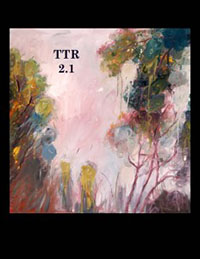 The Tishman Review quarterly is available online as a PDF, but it’s also wonderful to hold this full-size, 8.5 x 11 perfect bound print copy. The pages provide generous space for art and poetry, with prose cut to two columns for easier reading. The gorgeous cover art Of Skin and Earth by Stephen Linsteadt in just the invitation readers need to continue on inside.
The Tishman Review quarterly is available online as a PDF, but it’s also wonderful to hold this full-size, 8.5 x 11 perfect bound print copy. The pages provide generous space for art and poetry, with prose cut to two columns for easier reading. The gorgeous cover art Of Skin and Earth by Stephen Linsteadt in just the invitation readers need to continue on inside.
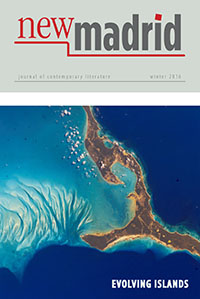 The theme for New Madrid Winter 2016 is “Evolving Islands” and features a selection of essays, poetry, and fiction in response to this theme. The cover art is courtesy of NASA, “Eluthera Island, Bahamas, 2002.”
The theme for New Madrid Winter 2016 is “Evolving Islands” and features a selection of essays, poetry, and fiction in response to this theme. The cover art is courtesy of NASA, “Eluthera Island, Bahamas, 2002.”
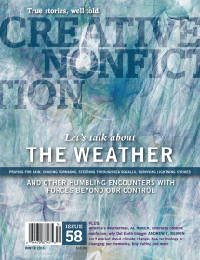 In keeping with Creative Nonfiction‘s theme “Let’s Talk About the Weather,” this cover image comes from artist and designer Mark Nystrom‘s “wind drawings” series. Driven by the weather, this series is a drawing process Nystrom developed using weather instruments and custom electronics that collect wind data that is then digitally interpreted. Nystrom’s images accompany each essay in this issue of CNF.
In keeping with Creative Nonfiction‘s theme “Let’s Talk About the Weather,” this cover image comes from artist and designer Mark Nystrom‘s “wind drawings” series. Driven by the weather, this series is a drawing process Nystrom developed using weather instruments and custom electronics that collect wind data that is then digitally interpreted. Nystrom’s images accompany each essay in this issue of CNF.
Spread the word!
The Literary Review – Winter 2004
The Literary Review had a strange, other-worldly feel to it, the stories and poems a mixture of reality and surrealism. It’s some of the best damn writing I’ve read in awhile. I’ve rarely encountered a story as disturbing as “The Child,” by Edgar Brau, which depicts five women who are jailed shortly after giving birth to children. They must hide themselves behind hoods when their jailers approach; the punishment for failing to do so is death. Each woman, one by one, is taken away, presumably for execution, but not before the jailers send the women dolls as “replacements” for the babies that were taken from them. No explanation is given as to context for this story, or why these women and not others, or anything else; the women themselves have no understanding. This off-world is reality, and you must accept it on its own terms. Other noteworthy stories and poems include “The Widow in Her Weeds,” by W.J. Thornton; “Walker Percy in the Desert,” by William Miller; and “Polar Animal” by James Grinwis. [The Literary Review, 285 Madison Avenue, Madison, NJ 07940. E-mail: [email protected]. http://www.theliteraryreview.org/] – JP Continue reading “The Literary Review – Winter 2004”
Spread the word!
Storie – All Write – 2003
I read this literary magazine from cover to cover. (Well, OK, this is a bilingual publication. I did NOT read the Italian translations of stories, just the English.) Every story in it was fabulous, every interview with the author of the published stories interesting. From Joyce Carol Oates’s exploration of a young girl’s disappearance in a New Jersey town to Massimo Lolli’s description of a dance hall where strangers meet for a few minutes for sex and intimacy, the four stories collected in this volume were stunning. However, my favorite part of Storie is the section near the end where they include a short paragraph critiquing the stories that they rejected for this issue. Witty, kind, but also critical, these paragraphs seem a unique service to the writer: a mention of the story and its merits but also its shortcomings. [Storie,Via Suor Celestina Donati 13/E, 00167 Rome, ITALY. E-mail: [email protected]. Single issue $10. http://www.storie.it/contenuti/english.HTM] – JP Continue reading “Storie – All Write – 2003”
Spread the word!
Blue Mesa Review – 2003
I expected something devoted a bit more to Southwestern literature, since Blue Mesa Review is published at the University of New Mexico, but this appeared to be a standard literary magazine without regional focus. This issue is jam packed with great essays, stories, and poems, including “Weathering the Freeze” by Bonnie Jo Campbell, a visceral description of sub-zero weather on a farm in Michigan; “Black Box,” by Katherin Nolte, a short story about a woman having an affair with a man whose wife becomes a zombie, quite possibly because the philandering woman’s husband knows voo-doo and has discovered his wife’s affair; and a long section featuring Gene Frumkin’s poetry, whose work “succeeds above ground and deep in the mine shaft.” Because I love non-fiction rooted in a sense of place, my favorite piece in this issue is an essay by Jennifer Brice, entitled “Wild Music: Reflections on Big Oil and Innocence.” In it, Brice explores the Alaskan past and present, explaining that yes, the “pipeline” and “oil” changed Alaska in myriad ways, but the core part of Alaska that “seems unwilling to compete with or improve upon nature” has remained the same. [Blue Mesa Review, University of New Mexico, Dept. of English/Hum 217, Albuquerque, NM 87131. E-mail: [email protected]. Single issue $12. http://bluemesareview.org] – JP Continue reading “Blue Mesa Review – 2003”
Spread the word!
African American Review – Summer/Fall 2003
I remember reading about the controversy over Amiri Baraka’s poem, “Somebody Blew Up America,” written and performed after 9-11 and after Baraka’s appointment as poet laureate of New Jersey. One line in the poem— “Who told 4000 Israeli workers at the Twin Towers / to stay home that day”—was condemned as anti-Semitic and led, ultimately, to Baraka’s sacking as poet laureate. In this issue, African American Review explores not only that incident (and whether it is legitimate to condemn Baraka as anti-Semitic), but they publish several controversial Baraka poems, an interview with Baraka, and essays covering the range of Baraka’s career as a poet and radical. Among the most notable poems, “Somebody Blew Up America” and “The McVouty Bible,” both showcasing Baraka’s anger and politics. My favorite essay was “Sometimes Funny, But Most Times Deadly Serious: Amiri Baraka as Political Satirist” by Jiton Sharmayne Davidson, which explores the history of Baraka’s satire, from his earliest, humorous attempts to his latest jabs at former New York Mayor Giuliani. [African American Review, Saint Louis University, Shannon Hall 119, 220 N. Grand Blvd., St. Louis, MO 63103-2007. E-mail: [email protected]. Single issue $12. http://aar.slu.edu/] – JP Continue reading “African American Review – Summer/Fall 2003”
Spread the word!
Main Street Rag – Winter 2004
Don’t let the title fool you—there’s nothing rag-like about this small, beautiful journal. Encompassing two short stories, an illustrated humor piece on a phallic mushroom species, an interview with poet Mark Morris, reviews and poetry, the latest volume of Main Street Rag is as elegant in presentation as it is edgy in content. Mike Watson’s cover art alone is worth the issue price. The two short fiction pieces by Nils Reid and Mary Ann Ruhl Thomas are in keeping with Main Street’s professed bias for grittier material, treating, respectively, a morally lapsed missionary and a girl contemplating killing her father. However, it is the poetry that dominates these pages, with some established voices alongside many newer ones. Aside from a couple of sonnets, the journal favors free verse in a range of styles, from Louis Daniel Brodsky’s highly imagistic “Conception: A Recollection,” to Kevin Sweeney’s facetiously trendy “Hopefully.” There are memorable speakers in these poems. Pamela Garvey’s beggar in “Toward the Face of Absence” challenges us: “Who assumes responsibility? / Who slips pennies into a cup clanging / with emptiness.” But the editors also enjoy a laugh and on the facing page give us Nathan Graziano’s English teacher, desperate to interest a terminally bored class: “Extended metaphors / sweat in the sheets, / Payment for sticking around / for the entire poem.” Graziano closes his poem with an unforgettable deadpan that I won’t give away here. Intellectually stimulating, accessible, enjoyable—Main Street Rag is everything you could want from a literary magazine. [Main Street Rag, Main Street Rag, 4416 Shea Lane, Charlotte, NC, 28227. E-mail:[email protected]. Single issue $7. http://www.mainstreetrag.com/TheHub.html]- DM Continue reading “Main Street Rag – Winter 2004”
Spread the word!
Verse Dedicated to the Portfolio
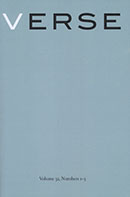 Since 2009, Verse has been dedicated to publishing a collection of works from each selected contributor. Readers who enjoy spending more time with one author will appreciate this format; the most recent issue offers nearly 450 pages to only 14 portfolios by Natalie Eilbert, Sandra Simonds, Timothy Liu, Eric Pankey, Karla Kelsey, Leonard Schwartz, Kate Colby, John High, Kathryn Cowles, Douglas Piccinnini, Laressa Dickey, B.J. Soloy, Aleah Sterman Goldin, and Kevin Varrone. Verse is housed in the English Department at the University of Richmond, with Faculty Editor Brian Henry’s ENG 393 students involved in the editorial process.
Since 2009, Verse has been dedicated to publishing a collection of works from each selected contributor. Readers who enjoy spending more time with one author will appreciate this format; the most recent issue offers nearly 450 pages to only 14 portfolios by Natalie Eilbert, Sandra Simonds, Timothy Liu, Eric Pankey, Karla Kelsey, Leonard Schwartz, Kate Colby, John High, Kathryn Cowles, Douglas Piccinnini, Laressa Dickey, B.J. Soloy, Aleah Sterman Goldin, and Kevin Varrone. Verse is housed in the English Department at the University of Richmond, with Faculty Editor Brian Henry’s ENG 393 students involved in the editorial process.
